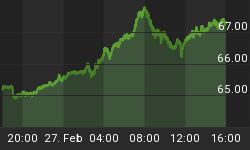This morning's release of disappointing GDP figures for the third quarter capped a week of bad economic news. Nevertheless, Wall Street bulls continued to march to the pleasant beat of the "soft landing" scenario. The Fed's benign policy statement provided the soothing cadence upon which the National Association of Realtors chanted their rosy outlook for the housing market, despite more evidence supporting the opposite. However, a "soft landing" simply cannot be willed into existence no matter how many embrace it as a sure thing.
The 1.6% growth rate announced today was the slowest since the first quarter of 2003, and was highlighted by the biggest drop in home building in 15 years as well as record high trade deficits which subtracted .58% from the GDP. Some on Wall Street focused their attention on the higher than expected 3.1% rise in consumer spending as further confirmation that the "soft-landing" has been achieved. But the fact that over-leveraged consumers went deeper into debt to buy imported products is hardly worth celebrating.
In its October 25th policy statement, the Fed declared that "the economy seems likely to expand at a moderate pace" and that "inflation pressures seem likely to moderate over time." While this sentiment is the very essence of the "soft landing" hypothesis, it is totally unsupported by the data. First, it is premature to conclude that the current slowdown will not culminate in a recession. In fact, the weight of the evidence, particularly in housing and autos, suggests not only a recession, but a severe one.
The Fed's rosy outlook on inflation seems to be based solely on the recent decline in oil prices. However this overlooks the fact that the underlying long-term trend for oil prices is still up (despite the recent pullback), and that prices of non-energy related commodities have been surging to new highs. Further, the potential for a sharp drop in the dollar which would likely accompany any recession would exert additional upward pressure on consumer prices and interest rates and downward pressure on the economy, exacerbating both inflation and the recession simultaneously.
As if denial of economic weakness wasn't great enough among Wall Street strategists and the Fed's board of governors, nowhere is it more extreme than among realtors. This week the National Association of Realtors heralded the first back-to-back monthly decline in home prices since 1990 as "setting the stage for a stable market" and indicated that "the worst was behind us." My guess is that if the NAR's chief economist David Lereah had been the newscaster covering the arrival of the Hindenburg in New Jersey in 1937 (rather than Herb "Oh the Humanity" Morrison), it too would have been described as a "soft landing."
Lereah suggested that the slight dip in inventory of unsold homes was evidence that a bottom had been reached. However, this decline more likely resulted from discouraged sellers temporarily removing their homes from the market rather then legitimate transactions. My guess is that sellers will simply re-list these homes in the spring, on the assumption that "new listing" status during what is typically a strong home-buying season will increase the odds of an actual sale. However, my feeling is that by then the inventory of unsold homes will swell to new records, as more sellers with similar strategies list their properties as well.
Inventories of new homes also fell, but only as a result of developers slashing prices by 9.3%, the most in 36 years. In fact, were sales prices reduced to reflect the value of seller provided incentives, actual price decline would have been much greater, perhaps the greatest ever. It will be interesting to see how the real estate Rumplestilskins attempt to spin gold out of this straw.
Do not wait for euphoria to end. Protect your wealth and preserve your purchasing power before it's too late. Discover the best way to buy gold at http://goldyoucanfold.com, and download my free research reports on investing in foreign equities at https://www.europac.net/report/index.asp and on the best Canadian Energy Trusts at https://www.europac.net/report/index_energy.asp.















